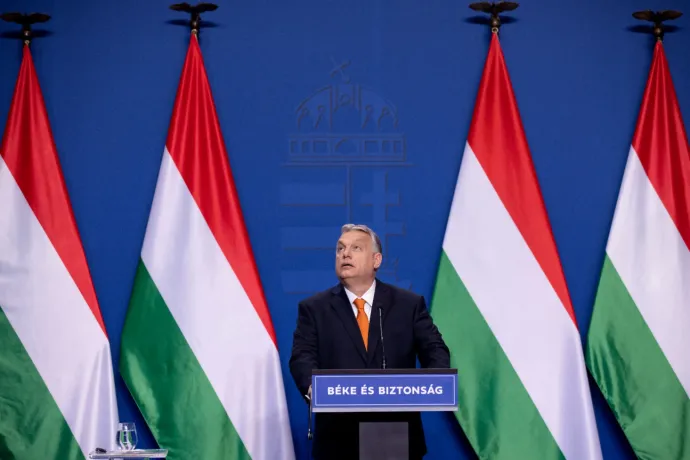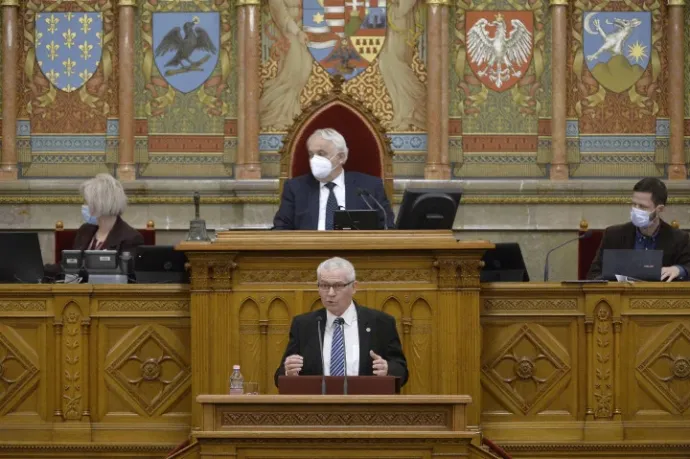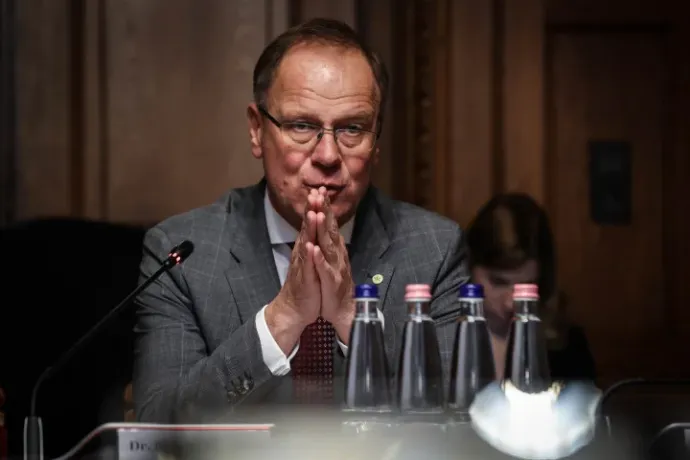
On Sunday, the European Commission decided not to close the rule of law procedure – also known as the conditionality procedure – against Hungary, but to refer the case to the Council of the European Union.
The Council consisting of ministers of EU countries will vote on whether the Hungarian government can access the EU funds it is entitled to. The Commission proposed on Sunday that Hungary should be stripped of 3,000 billion forints for abuses over the use of EU funds, but
the government has been given two months' grace to implement the anti-corruption measures promised to the Commission earlier.
The Commission says that if the government delivers on its commitments by the end of November, it will have access to the full amount, as funds are protected thanks to measures such as the creation of the Integrity Authority, the regulation of public benefit foundations and the reduction of one-bid public procurement procedures.
But now it is up to the government to prove it, Commission Vice-President Věra Jourová said in an interview published on Monday. And the government continues to promise taking the steps necessary for obtaining the funds. The first package of measures was presented to Parliament on Monday, and a second package is expected to be submitted on Friday.
In the meantime, the Commission has revealed the specific steps the government has undertaken in the hope of obtaining the funds.
Seventeen promises from the government
1. Establishment of the Integrity Authority
This would be the brand new anti-corruption institution that the government intends to set up for preventing and monitoring potential fraud, conflict of interest and corruption. But it could only do this for projects funded by the European Union, according to the proposal.
According to Tibor Navracsics, the Hungarian Minister for Regional Development, who is the main actor on the Hungarian side in the negotiations with the Commission, the establishment of the Integrity Authority is the most difficult part of the seventeen-point package, as it is necessary to regulate not only the guarantees of the independence of the institution but also the open procedure for the election of its president.
The work of the Integrity Authority is due to begin on 19 November, but domestic anti-corruption organisations are sceptical about its establishment. József Péter Martin, executive director of Transparency International Hungary, told Telex: "There has never been a truly independent monitoring institution in Hungary in the last 12 years. If this were to happen now, it would be a huge breakthrough that would go beyond the fight against corruption, but the chances of that happening are slim."
2. Setting up an anti-corruption task force
The anti-corruption task force was originally set up in 2012 by the then Ministry of Justice under the leadership of Tibor Navracsics, but less than a year later several organisations withdrew from the group after the government restricted access to data of public interest by amending the Freedom of Information Act.
Navracsics resigned from the ministry in 2014 and the task force was disbanded, but it would now be revived and headed by the chairman of the Integrity Authority. The group was originally only to include the heads of public organisations, but after negotiations with the Commission, it is now planned to include an equal number of government and non-government members.
The task force would produce an annual report to the government, including proposals for preventing, detecting and sanctioning corruption. The task force should be up and running by 1 December at the latest, according to the Commission's official document.
3. Strengthening the anti-corruption framework
A national anti-corruption strategy and action plan should be adopted by the government by 30 June 2023, with the active participation of the Anti-Corruption Task Force.
The government has also committed to broaden the scope and content of asset declarations and to strengthen the control of declarations – legislation on this is due by 1 November.
4. Transparent management of public trusts with a public-service mission
As part of this, at the latest by 30 September, new rules pertaining to conflict of interest will be introduced into the life of the public trusts that many Hungarian universities are run by. Initially, there were rumours that Fidesz politicians who had been appointed for life to the boards of trustees of these universities – including Balázs Orbán of the Foundation of MCC, Judit Varga of the University of Miskolc, Peter Szijjártó of Széchenyi University of Győr and István Nagy and János Lázár to the board of the Hungarian University of Agricultural and Life Sciences – would have to be removed from the boards.
However, Tibor Navracsics says that this is not what the Commission expects. "There are many examples of this in Western Europe, but it does not in itself constitute a conflict of interest, only if the politicians are personally involved in a particular case. If this is the case, one simply steps out of the decision-making process," the regional development minister told ATV, adding that the Commission had no objections to lifetime mandates. Indeed, the latter was not mentioned in the Commission document, nor is it required by Brussels that ministers and Fidesz politicians delegated to the boards of trustees must leave.
5. Judicial review of prosecution decisions
The latter would mean that if the prosecutor's office closes an investigation into a major offence relating to the exercise of public authority or the management of public property, a judicial review could be sought. And if the judge so decides, the investigation closed by the prosecution could be reopened and proceedings could be initiated – with the prosecution being excluded. Individuals and legal persons may also initiate judicial review proceedings. The law must be drafted by the government by 31 October and enter into force no later than 15 November.

6. Strengthening control and supervision mechanisms for the implementation of EU funds
According to the document, the government has already set up a new task force to tighten up the rules around the various EU funds by 31 August. The task force is working closely with the Commission to develop the rules and has already met four times in September.
The setting up of an Internal Audit and Integrity Directorate in the Prime Minister's Office by 30 September also strikes as a novelty. However, no details are given in the Commission document.
7. Reducing the proportion of single-bid public procurement procedures financed by EU funds
The government has committed to reducing the proportion of single-bid public procurement procedures closed in 2022 to below 15% by the end of the year. It has also committed to maintaining the rate below 15% "without time limit" in the future – this will be reviewed annually and if the rate is higher than 15% in any given year, measures will be taken to reduce it within four months.
8. Reducing the proportion of single-bid public procurement procedures financed from the national budget
As with EU-funded tenders, the government has committed to a 15% limit, but this would be reached in three stages, until the end of 2024.
9. Registration of single-bid public procurement procedures
By 30 September, the government must develop a tool for registering single-bid public procurement. A report on these would be published annually by 15 February in the Electronic Public Procurement System.
10. Improving the Electronic Procurement System (EPS) to increase transparency
This would include free access to public procurement data by 30 September at the latest.
11. Central registration to ensure the increased transparency of public expenditure
The government has also set a deadline of 30 September for the establishment of a framework to examine the utilisation and cost-effectiveness of public procurement. The measurements would be carried out with the involvement of independent experts and NGOs.
12. Developing an action plan to increase competition in public procurement
By 31 March 2023, the government should come up with an action plan to promote competition in public procurement, and the implementation of the plan would be reviewed annually.
13. Training of micro, small and medium-sized enterprises in public procurement
With this commitment, the government is first of all aiming to help micro and small enterprises by providing free training to at least 1,000 enterprises by 31 March 2024. In addition, a further 1200 businesses would receive free training until July 2026.
Preparations for this began in July, and the process is headed up by the Prime Minister's Office. According to Üzletem.hu, a consortium may apply for a 460 million HUF non-refundable grant under Széchenyi Terv Plus.
14. Support scheme for the participation of micro, small and medium-sized enterprises in public procurement
A scheme would be launched by 31 March 2023 to provide 1,800 enterprises (again, mainly micro and small enterprises) with lump-sum support for their public procurement tenders. The programme would run until July 2026 and its effectiveness would be reviewed in autumn 2024.
15. Extended use of the Commission's Arachne risk assessment tool
From 30 September 2022 at the latest, the government will make use of Arachne, a programme developed by the European Commission to prevent and detect, among other things, cases of conflict of interest, fraud and corruption. Data uploaded into the data mining and risk assessment tool will be accessible to all relevant audit and supervisory bodies.
16. Strengthening cooperation with OLAF
The details of this were presented on Monday: the bill would give the National Tax and Customs Office the task of supporting OLAF investigations or on-the-spot checks. Special rules on the actions of the tax authorities would allow OLAF staff to enter the premises under investigation or any other area used for business purposes together with the tax authorities. By securing the premises, the financial investigators would support the smooth conduct of the investigation, allowing OLAF inspectors access to necessary documents and data carriers and protecting them against any physical resistance. If someone does not comply, the NAV can impose an administrative fine of one million forints, even repeatedly.
17. Increased transparency in the use of public funds
This would require all public institutions to publish information on how they use public money. A draft law to this effect will be submitted to the Commission for preliminary examination by 30 September and must be adopted by Parliament by 31 October.
Now it's up to the government
If the government keeps its promise and delivers on the seventeen points, in two months' time – on 19 November – the Commission will probably propose that the Council of the European Union should give Hungary all the funds and not suspend HUF 3 000 billion from them. However, the Commission document states at several points that it will actively monitor the implementation of Hungarian measures, so although it acknowledges the Hungarian initiatives, it does not have 100% confidence that they will be implemented.
Tibor Navracsics, the minister who has been asked to play the role of chief negotiator in Brussels, said last week that it could take months or even years to rebuild trust between the EU institutions and the government. "It is a realistic and expected position that, while they welcome the steps we are taking, they want to monitor them. You cannot abolish the rule of law procedure overnight," he said at an event on Thursday in response to a question from Telex.

European Commission Vice-President Věra Jourová said in an interview published on Monday that "it is now Hungary's turn to deliver". She said the government must convince member states over the next three months that they can protect European taxpayers' money.
So now the decision concerning the funds due to be received by Hungary is in the hands of the Council of the European Union. The Commission has advised the Council to wait until 19 November to make a decision, because the Hungarian government can make meaningful reforms by then. The government has committed to most of the measures with a deadline of 30 September, so we should be able to see if the promises are delivered by November.
Will there be money?
As things stand, there are three possible scenarios:
1: The Commission, seeing the measures, withdraws the procedure launched under the rule of law mechanism before the Council vote. Although the government says this is also possible, it is less likely as several members of the Council – including Jourová and Justice Commissioner Didier Reynders – have said that Hungary's case will now have to be decided by the Council. This would be a refutation of the Commission itself.
2: The Council votes and Hungary is exempted from the suspension of funds. This has the best chance of happening, and it is what the government expects. Although the vote would require a qualified majority rather than unanimity, not only could Poland vote against the proposal, but also the new Swedish and Italian governments might be in place by the end of November – and opinion polls suggest a right-wing majority in both countries. In addition, by then the government would have taken the steps the Commission says it needs to take, which would lead them to propose that Hungary should get the money.
3: The Council votes and the funds are suspended. Whenever members of the government have been asked about this by journalists, they claim that this is not an option they are considering. Moreover, as we have reported before, in the other rule of law case against Hungary, the Article 7 case, no qualified majority for Member States' recommendations has been reached in the Council.
This leads us to assume that the second scenario will work and there will be money – but when? On Tuesday, Tibor Navracsics said that although negotiations with the Commission on the conditionality procedure had been concluded, talks were only now opening on two other areas: the recovery fund and cohesion funds.
It is expected that the government's commitments will speed up the negotiations on these two issues, as the Hungarian recovery plan was also opposed by the Commission because of the lack of anti-corruption measures.
But it remains to be seen how Brussels will deal with the issue.
Mr Navracsics hopes to reach an agreement with the EU on the funds Hungary will receive by the end of the year, but due to administrative procedures, they will only be accessible early next year. The minister also said that in most cases the state pre-finances EU programmes because the agreement on the seven-year budget was reached too late, anyway. The Hungarian government has already launched the first tenders, including the ones for the residential solar panel programme.
For more quick, accurate and impartial news from and about Hungary, subscribe to the Telex English newsletter!